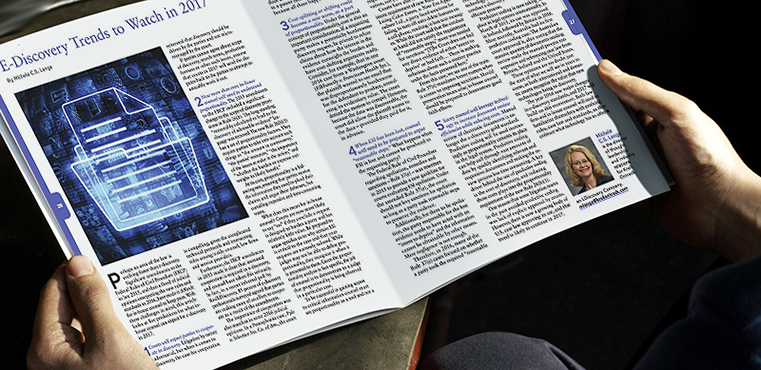Corporate Counsel: Watch These 5 Ediscovery Trends in 2017

If you are in-house counsel, you need to be in-the-know when it comes to ediscovery.
As amendments to the Federal Rules of Civil Procedure (FRCP) take hold, 2016 saw major changes in ediscovery standards and 2017 will build on this momentum. In the upcoming months, expect courts to continue to define proportionality, embrace technology and become less forgiving of attorneys who lag behind and use outdated rules. Recently, I had the opportunity to publish an article in Today’s General Counsel. Ediscovery Trends to Watch in 2017 discusses the weighty ediscovery issues that in-house counsel must address throughout this year.
- Cooperation is expected. In 2016, court decisions made it clear that under amended FRCP Rule 26, it is the parties, not the courts, who need to manage discovery. Without cooperation, courts quickly return discovery disputes back to the parties for resolution. In-house counsel can reduce their costs by addressing discovery issues upfront with their opponents and avoiding costly court hearings and irate judges.
- Proportionality is key. Perhaps the biggest change to the discovery rules was a new requirement for discovery to be “proportional to the needs of the case.” In-house counsel must ensure that their discovery requests are specific and add value to their case in relation to the accompanying expense.
- Be prepared to defend or refute costs. Under the proportionality doctrine, courts look closely at the balance between benefit and burden. Requesting parties should be prepared to foot the bill for costly discovery if a greater benefit is not illuminated. When refuting a request as too burdensome, be ready to argue an imbalance with the benefit and suggest shifting the cost to the requesting party.
- Accountability matters when spoliation occurs. Under amended FRCP Rule 37(e), when a party claims lost or damaged evidence, courts will not find spoliation unless there was an “intent to deprive the other party.” However, in-house counsel must be prepared to explain “reasonable steps” taken to preserve evidence and prove that it cannot be reproduced in another format.
- TAR is the new norm. Savvy counsel will leverage predictive coding and Technology Assisted Review (TAR) to increase document review efficiencies and reduce costs. 2017 will likely see additional commentary from the bench on the use of TAR and counsel must be ready.
